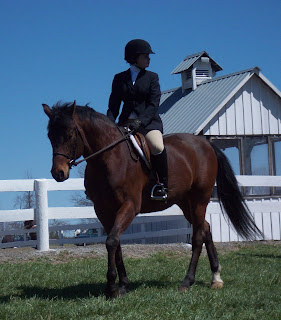
I get asked for advice all the time - after all it is the nature of my business! Recently someone contacted me out of concern for a friend. The friend has been around horses and showing all her life, and owns one horse. The friend currently has one student that she just began giving lessons. The horse that she gives the lessons on belongs to the person that owns the private farm where the she keeps her horse. She doesn’t use her own horse because it isn’t a suitable beginner mount. She is able to keep her horse at the private farm at no cost because she occasionally takes care of the farm owner's other horses. She is now considering buying a second horse with the hope that she could turn it over right away or keep it to give lessons with. She does have a buyer in mind, but not confirmed. My friend’s concern is that if she continues giving lessons, that the farm owner will not want the friend to use her horse for lessons anymore.
The person that contacted me didn’t think this sounded like a good business plan and wanted to know how many lessons her friend would have to give in order to reach break-even. Well…yikes! This situation raises several red flags for me. Break-even is not the top one either. There are lots of elements that go into deciding to buy a horse as a lesson horse in this situation. I’ll list some of them here – but I often find that once someone has decided to buy a horse that it can be very difficult to get them to change their mind – somehow they have already made an emotional commitment within themselves. They could be in love with the horse, or in love with the idea.
1) If she is going to be operating a business on this property owners land, she and the property owner should have an agreement in place first. If there isn’t an agreement, it could easily blow up and your friend will be looking for a new place for her TWO horses!
2) If this is a private farm – is anyone covered by liability insurance for the lessons your friend is giving? These days most public facilities require free lance instructors to carry their own policy in addition to what they carry as a stable. If this is a private facility – they may not carry this type of insurance at all. This is a HUGE risk for all involved.
3) To calculate break-even for buying a horse you should take into account all the operating expenses for keeping that horse, as well as business costs, for example:
a. Board
b. Veterinarian and other complementary therapists
c. Dentist
d. Farrier
e. Supplements/medicine/wormers
f. Insurance – liability and horse
g. Tack, blankets, leg wraps and other horse clothing and equipment – these are more of a one time expense, like the horse – but breakage and wear and tear should be considered
h. Phone
i. Advertising
If you calculate these expenses for a year, and then break that into how many months out of the year she can teach, it will tell you how many lessons she needs to give (based on what she charges) each month. Sometimes people aren’t able to teach in the winter – their students aren’t interested in riding then (if in northern climate – could be summer if in southern climate) and/or the instructor doesn’t have access to covered facility to make it possible, so the annual expenses need to be divided by the number of months she is actually able to teach.
There is no single answer for how many lessons she would need to give because horse keeping costs vary from region to region, and lesson fees vary some too.
These operating expenses don’t take into account the cost of the horse itself. The horse can be resold and she may get her investment back. But she may not. And in the current economy, the market is full of horses for sale at low prices as well as being given away free.
This scenario is frustrating and frightening. This person is stumbling haphazardly into a business that requires high risk management diligence. For everyone's concern, break-even is not the first question that should be asked.
